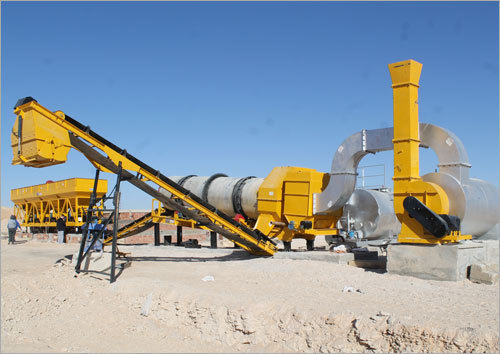Project Report For Hot mix plant
Introduction
Project Report for Hot mix plant is as follows.
A hot mix plant, also known as an asphalt mixing plant or an asphalt batch mix plant, is a facility that manufactures asphalt concrete. It is an important component in road building, since it ensures the quality and longevity of asphalt pavements.
A hot mix plant’s principal duty is to combine aggregates, asphalt, and other additives to generate hot mix asphalt (HMA). To obtain the correct asphalt mixture, aggregates such as crushed stone, sand, and gravel are mixed in particular amounts. To eliminate moisture and improve adhesion with the asphalt binder, the aggregates are heated and dried in a drum or drier machine.
The asphalt binder, a petroleum-based chemical that binds the aggregates together, is then added as the following stage. In a separate mixing unit, the binder is heated and blended with the dry aggregates. Depending on the desired qualities of the final asphalt mix, several asphalt binders, including bitumen, are utilised. After completely mixing the aggregates and binder, the hot mix asphalt is unloaded into trucks or storage silos for transportation and subsequent usage.
To guarantee appropriate mixing and workability, the temperature of the HMA is carefully maintained throughout the process. Hot mix plants are available in a variety of sizes and configurations, from tiny portable units to huge stationary operations. They are outfitted with sophisticated control systems that monitor and manage the production process, assuring consistency in asphalt mix quality.

Benefits Of Hot Mix Plant
High-Quality Asphalt: Hot mix plants provide for exact control over the asphalt mixture, resulting in high-quality asphalt manufacturing. Controlled mixing of aggregates, asphalt binder, and additives ensures that the asphalt mix fulfils the required criteria, resulting in better pavement quality, longevity, and performance.
Enhanced Durability: The usage of hot mix asphalt (HMA) generated by hot mix plants leads to more durable asphalt pavements that can resist significant traffic loads. HMA resists rutting, cracking, and deformation better than other materials, resulting in a longer service life for roads and highways.
Faster building: Hot mix plants allow for the efficient and speedy building of asphalt pavements. The continuous manufacturing process ensures a continual supply of HMA, enabling a smooth and uninterrupted paving operation. This reduces construction time, minimising traffic delays and discomfort to road users.
Versatility: Hot mix facilities are versatile in that they can produce several types of asphalt mixtures to fulfil individual project needs. They may generate various grades of asphalt, such as dense-graded, open-graded, and gap-graded mixtures, for a variety of uses such as roads, airports, parking lots, and racetracks.
Cost-Effective: Although hot mix plants need an initial investment, they can be cost-effective in the long term. The durable and high-quality asphalt generated by these facilities eliminates the need for regular maintenance and repairs, resulting in lower life-cycle costs for road infrastructure.
Environmental Advantages: Hot mix plants use technology that reduce emissions and enhance environmental sustainability. They use dust collecting systems, baghouses, and other pollution control methods to limit air pollution throughout the manufacturing process. Furthermore, some hot mix facilities can employ recycled asphalt pavement (RAP) as a component in the asphalt mix, lowering the demand for virgin materials and encouraging the reuse of existing resources.
Market Potenital Of Hot Mix Plant
The market for asphalt mixing plants is expected to reach USD 6 billion in 2022 and grow at a 3% CAGR from 2023 to 2032 as a result of an increase in road building projects.
The batch process sector of the asphalt mixing plants market is anticipated to reach USD 6.5 billion by 2032. The cheap operating expenses of the process, as well as the low cost of spare components, are boosting the industry. The batch process generates the most money since it increases the demand for asphalt, which is mostly utilised in road building and other civil construction projects.
The stationary asphalt mixing plant type is expected to develop by 3% between 2023 and 2032. The rising number of new and current large-scale building projects globally is driving demand. These projects create a massive spike in large-scale asphalt aggregate manufacturing. Stationary facilities can produce enormous amounts of asphalt mix while maintaining excellent uniformity and mix quality. Because of their efficiency and capacity to produce more material, they are well suited for commercial building projects.
Project Report Sample On Hot Mix Plant
Need Help?
Create 100% Bankable Project Report
